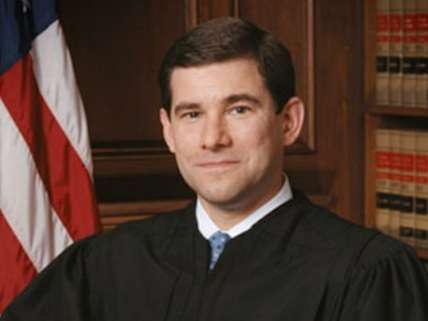The Trouble With Trump SCOTUS Contender William H. Pryor
There are reasons to worry about the 11th Circuit judge on Trump's Supreme Court shortlist.

President-elect Donald Trump will soon announce his pick to replace the late Justice Antonin Scalia on the U.S. Supreme Court. Among the 21 potential candidates that Trump has floated so far, one name in particular has many conservatives buzzing with excitement. That name is Judge William H. Pryor Jr. of the U.S. Court of Appeals for the 11th Circuit. In the admiring words of National Review, Pryor "isn't just regarded as a brilliant legal mind; he is viewed as the most rock-ribbed conservative of any potential Supreme Court appointee."
Pryor's brand of conservatism was certainly on full display back in 2003 when the U.S. Supreme Court was weighing the constitutionality of a state law that criminalized "homosexual conduct" in a case known as Lawrence v. Texas. At that time Pryor was working as the attorney general of Alabama (Jeff Sessions was his predecessor in that job). In a state amicus brief he filed at the Supreme Court in Lawrence, Pryor came out firmly in defense of every state's unbridled power to incarcerate consenting adults for the supposed crime of having same-sex relations in the privacy of their own homes. "The States can and must legislate morality." To rule otherwise, Pryor's brief declared, would be to enshrine a "sophomoric libertarian mantra."
Pryor's career is replete with that sort of stuff. Indeed, it is his social conservatism for which he is perhaps best known—both in and out of legal circles. But there is something else to know about Judge Pryor. Namely, he is an adherent to the legal philosophy known as judicial deference.
Judicial deference is the idea that because the judiciary is the least democratic branch of government, judges owe extra respect—or deference—to the actions and decisions of the elected branches of government. In practical terms, that means that the courts are supposed to tip the scales in favor of the government in the vast majority of cases. In the words of Progressive era Justice Oliver Wendell Holmes Jr., one of the Supreme Court's earliest and most influential advocates of judicial deference, "a law should be called good if it reflects the will of the dominant forces of the community, even if it will take us to hell."
This deferential philosophy has proven to be quite popular in certain quarters of today's conservative legal movement. The late jurist and scholar Robert Bork, for example, was a thoroughgoing Holmes-ian who insisted that, "in wide areas of life, majorities are entitled to rule, if they wish, simply because they are majorities." Chief Justice John Roberts has taken a similar view. In 2012, for example, when he cast the deciding vote to uphold the constitutionality of Obamacare, Roberts not only cited one of Justice Holmes' opinions, he explicitly invoked Holmes' deferential credo. "It is not our job," Roberts wrote in National Federation of Independent Business v. Sebelius, "to protect the people from the consequences of their political choices."
William H. Pryor follows in the deferential footsteps of Holmes, Bork, and Roberts. For example, in a 2007 article published in the Virginia Law Review, Pryor praised the Supreme Court's famous "switch-in-time" decisions from 1937, in which the Court upheld several sweeping New Deal economic regulations. After pointing favorably to National Labor Relations Board v. Jones & Laughlin Steel Corp., in which the Court adopted an expansive new interpretation of congressional power under the Commerce Clause, and to West Coast Hotel Co. v. Parrish, in which the Court overturned its previous line of cases protecting the fundamental right to liberty of contract, Pryor went on to write, "not every controversy requires a judicial resolution or trumping of the will of the majority." In those pro-New Deal opinions, Pryor concluded, "the judiciary wisely has acted with restraint." Justice Holmes could not have said it better himself.
To make matters worse, Judge Pryor's pro-government deference extends beyond the realm of economic activity. He also has a troubling record of favoring broad judicial deference towards law enforcement. Consider the case of United States v. Shaygan. At issue was the sweeping federal prosecution of a Florida doctor named Ali Shaygan on charges of illegally prescribing pain medication. In 2009, after a jury had acquitted Shaygan of all 141 charges lobbed against him, the U.S. District Court for the Southern District of Florida publicly reprimanded and sanctioned the federal prosecutors in the case for "gross negligence" and misconduct, including for the act of secretly recording Shaygan's legal defense team. The prosecutors "acted vexatiously and in bad faith," the district court concluded. Their actions "are profoundly disturbing" and "raise troubling issues about the integrity of those who wield enormous power over the people they prosecute."
The vexatious federal prosecutors then appealed to the U.S. Court of Appeals for the 11th Circuit. There they found a far more sympathetic audience in the form of Judge William H. Pryor. "The district court abused its discretion when it imposed sanctions against the United States for a prosecution that was objectively reasonable," Pryor ruled. The district court's reprimands and sanctions against the offending prosecutors were erased from the books.
Here's the thing. Federal and state lawmakers have an unfortunate habit of violating constitutional rights by passing arbitrary and unnecessary laws. Likewise, federal and state prosecutors (and police) have an unfortunate habit of violating constitutional rights by employing suspect law enforcement tactics. According to the devotees of judicial deference, however, the courts are supposed to tip the scales in favor of the government in such cases.
Regrettably, judging by his record on these crucial issues, Trump SCOTUS contender William H. Pryor seems to favor the same overly deferential approach.
